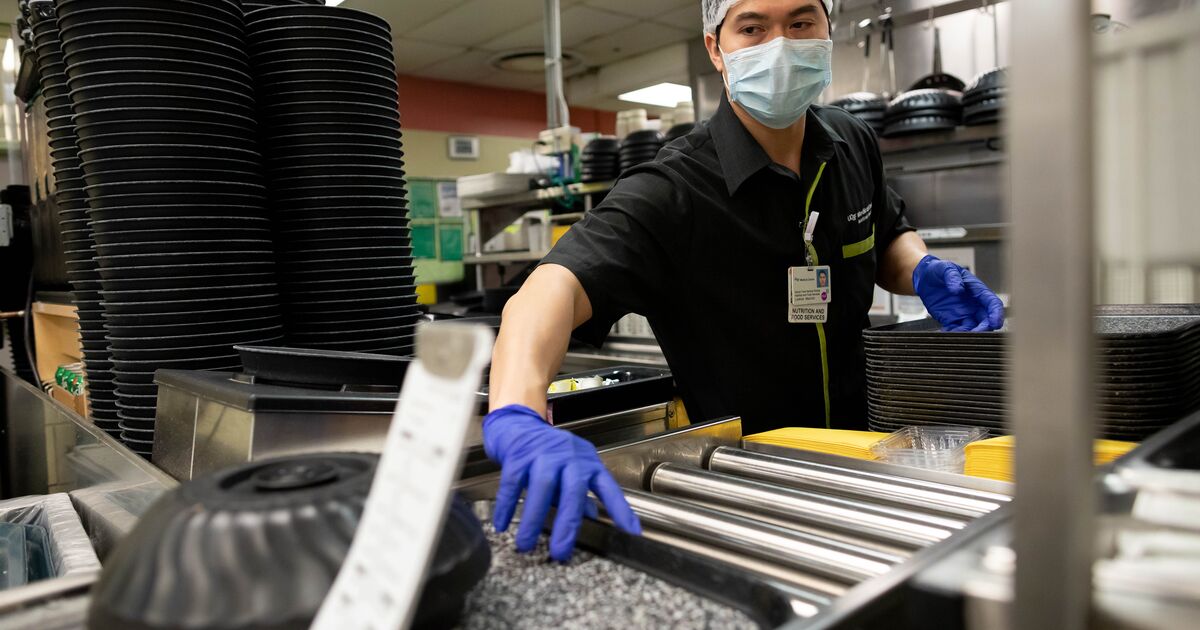Story by Em Mielke, zero waste analyst and climate corps fellow.
In navigating a life in which the effects of climate change are growing more apparent by the day, with news sources brimming with climate-doom, and more people and entities engaging in the language of disaster, it is not difficult to find an impossibility in the search for hope. Although, climate change is here and it has never been more imperative that we act now, there already remain many victories to be celebrated in the shift toward a greener culture.
At UCSF Health, healthcare is a pillar of everyday operations. As a member of Practice Green Health, the health system has implemented numerous initiatives across departments to address the large environmental footprint associated with running a health system on the leading edge of science and innovation. One department of particularly substantial impact is Nutrition and Food Services (NFS). NFS implemented several measures to combat food waste, reduce energy consumption, promote conscious habits, and empower guests to make environmentally informed decisions in their food choices.
NFS began its commitment to monitoring environmental impacts back in 2009, with the implementation of a program aimed at tracking the sustainability of chosen food sources. The initiative tracks the percentage of spending that is allocated to items that fall into sustainably minded categories, such as organics and fair-trade items.
Since the start of this program, sustainability in UCSF’s nutrition department has taken off with no sign of slowing down. Today, with many sustainability practices in place and several on the horizon, UCSF is well on its way to a cleaner, greener tomorrow. Here are some of the actions that are fueling our hope.
The Coolfood Pledge
The Coolfood Pledge aims to reduce the climate impact of food that organizations serve by shifting towards foods with a higher plant base. Pledge members commit to reducing their greenhouse gas emissions associated with served food by 25% by the year 2030, relative to a 2015 baseline. The weight of all animal-based foods and plant portions are reported, and Coolfood calculates the corresponding climate impact using a calculator, developed through an analysis undertaken by the World Resources Institute and based upon peer-reviewed methodology.
Sustainable Practices Policy
The food service sector in each of the three main health centers is striving to implement several new policies to improve the sustainability* of operational functions across the department. Under this policy, UCSF aims to supply a menu that is 30% more plant-rich by 2030, to support climate-informed food choices through access to educational and training materials, and to furnish an inventory of 30% sustainable food products by the year 2030. Plant proteins have a smaller environmental impact than animal-based proteins, in addition to having better health outcomes for consumers. Through empowering conscious choices and providing ethical options, actionable change is being implemented at the operational level, while maintaining accessibility and affordability for all students and health location’s patrons.
*Sustainability of procurement for this initiative is defined by Practice Green Health, a highly accredited organization that focuses on sustainability in healthcare and delivers environmental solutions to over 1,400 hospitals and health systems in the United States and Canada.
Food Recovery
With 10-15% of the total waste produced by hospitals coming from food waste alone, this is the area where changes are occurring at the widest scale. Here are some ways we mitigate food waste.
Source reduction
Food waste is being reduced at the source by ensuring meals are portioned out properly, increasing the availability of made-to-order meals, updating kitchen best practices, implementing sale and portion tracking to more accurately forecast supply needs, and partnering with Urban Remedy and Positive Foods to capture expired and soon-to-expire products for donation.
Food 4 UCSF Students
The Food 4 UCSF Students is a new app that sends out a text message to subscribers when there is excess food from catered events. The text includes the location details of where students may pick up the food on a first-come, first-served basis for up to 30 minutes after an event. This service prevents catered meals from going to waste and help
 Budget Bites graphic.
Budget Bites graphic.
s support students with food insecurity.
If you're a student, go to saa.ucsf.edu/food and follow the simple instructions to sign up for alerts.
If you are a UCSF event organizer, register as a food provider.
Budget bites
Budget Bites is a UCSF Health program that packages fresh, hot meals from the dining areas from food that was overproduced as a reheatable grab-and-go option at an affordable price. All meals are $4.50 regardless of the contents.
Replate
Replate donates meals to nonprofits that serve communities facing food insecurity. Replate picks up extra meals from the UCSF Health kitchens and delivers them to those in need, preventing food that would otherwise be discarded from going to waste.
Food Service Waste Capture
 A patient's food tray being prepared.
A patient's food tray being prepared.
All waste originating from food trays delivered to patient rooms is sorted. Patients are encouraged to leave unwanted leftovers and packaging waste on their trays, which get picked up by NFS staff, and sorted between compost, recycling, and landfill. At the Parnassus Heights hospital, there is a sorting team that sorts waste from all discarded food trays both from patient rooms and the café.
Composting
UCSF Health added compost bins to break rooms to capture food waste from staff. At Mission Bay and Mount Zion hospitals, the dining areas have compost bins with easy-to-follow sorting signage. In the Moffitt Café at the Parnassus Heights location, all compost is collected and sorted by NFS staff. In all UCSF Health kitchens, food waste is also composted. Food waste put into the garbage turns into methane gas and leaks into the atmosphere contributing to climate change. Food waste put into compost is converted to fertilizer for Napa vineyards and actually absorbs carbon from the atmosphere
Food Accessories
 Napkin dispenser.
Napkin dispenser.
UCSF Health has reduced food accessory waste by implementing single-dispense napkins, compostable food containers, and recyclable cups and utensils.
Oil recovery
Used cooking oil from food service kitchens is recovered and recycled through an external vendor. Used oil can be re-refined for cooking or reprocessed into fuel.
Electrifying The Kitchen
To reduce the energy use intensity of kitchen operations, UCSF food service kitchens are swapping traditional gas appliances for more efficient electric equipment. Water consumption is also being monitored and conserved through water-conscious tools and appliances.
Future Direction
UCSF Health’s sustainability department is in perpetual motion to increase the sustainability of our world-class healthcare in any way we can. We have several exciting projects in the works, such as efforts to expand our recycling stream and the development of Eco Eats, a program that is creating a climate-conscious label for food sold in the cafes that will provide a calculated emissions rating based upon the ingredients and preparation of each meal.
If you have an idea or suggestion or want to learn how you can be more sustainable, send us a message at healthsustainability@ucsf.edu, or stop by our office at 505 Parnassus suite M290, San Francisco CA, 94117.